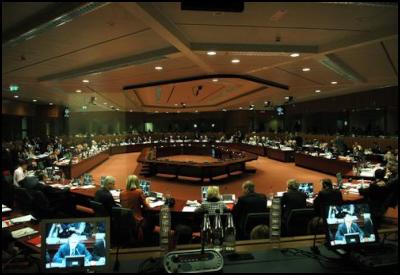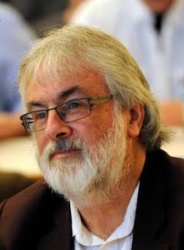Financial Crisis Sends Quake Through Divided EU
Financial Crisis Sends Quake Through Divided EU
Summary report by Scoop Co-Editor, Selwyn Manning
European Union is reeling after a week of division and ongoing debates over how to handle the deepening financial crisis. The situation has worsened fueling concerns that the EU could fracture.

Image courtesy of the Council of the European Union.
The weight of financial hardship continues to worsen within Europe's former soviet controlled eastern states while those of the old west argue over whether protectionist policies or a free market approach is the advised road ahead.
Media reports detail how Bulgaria's Socialist-led government called on the EU to compensate it for what it terms "the double blow" of a gas crisis and the global economic downturn. Bulgaria is suffering severe rates of unemployment, especially outside its capital city Sophia, and fears economic collapse.
 France's President Nicolas Sarkozy had moved to
assist France's car manufacturing industry through national
protectionist policies. Britain, Czech Republic and Portugal
strongly opposed Sarkozy's view.
France's President Nicolas Sarkozy had moved to
assist France's car manufacturing industry through national
protectionist policies. Britain, Czech Republic and Portugal
strongly opposed Sarkozy's view.
Britain's Prime Minister Gordon Brown warned that reinstituted protectionist policies by individual European Union states would further divide the EU and drive it back to the financial stone-age.
The anti-protectionist lobby states won the argument. But the divisions within the EU are deeper.
On March 1 the BBC reported European Commission president Jose Manuel Barroso stated. "There was consensus on the need to avoid any unilateral protectionist measures." He spoke after the summit aimed at heading off a new east-west rift, the BBC reported.
While the western EU states argued economic ideology, the eastern states wanted help. But such hopes were dashed with no announcement of any new EU aid package being targeted for the badly-hit economies of east Europe.
Eastern Europe is struggling. Poverty, unemployment, failing industry and collapsing standards of living is causing millions to doubt the great European Union dream.
Two weeks ago, Hungary had called for a 180b Euro aid package to assist Central and Eastern Europe. But the request was rejected.
Many of the eastern countries, Bulgaria, Romania among them joined the EU believing in a better future through regionalized co-operation, open markets, and a shared pact with a mission to lift the living standards of the entire Euro-block. That dream is proving elusive. The eastern nations want help and are calling on the more wealthy nations of the EU to compensate them as their economies fail.
And this week, the United States secretary of state Hillary Clinton met with EU and EC heads to work out a co-operative plan to tackle the worsening financial crisis.
At a press conference in Brussels on March 6, Viola Gienger from Bloomberg News asked Hillary Clinton: "Madame Secretary, can you comment on your views about how well Europe is handling dealing with the economic crisis at this point in relation to the joint efforts with the United States?"
Hillary Clinton played for time, and focused her answer on looking toward the G-20 summit in London on March 18, favouring a London/US led rationale backing a coordinated recovery plan.
She said: "With respect to the economic crisis, I think that there’s a great deal of close coordination and planning that is going on in preparation for the G-20 summit in London. As you know, Prime Minister Brown recently visited the White House and engaged in extensive conversations with President Obama and our economic team.
"I think that there is a very clear set of items that will be on agenda for the G-20 that will address the multiple aspects of this crisis: how do we stimulate demand; how do we provide assistance to countries that find themselves in difficult financial condition; how do we come up with a new architecture for the regulatory framework for the new economy, which has so many different instruments and the capacity to trade trillions of dollars with the flick of a computer key. There are so many matters that we are attempting to address, and the cooperation has been very positive.
"We all understand that it is in our joint interest to work together. As I said in my remarks, the United States and Europe are blessed to have so much economic capacity. Between us we have more than 800 million people, and so we have a special responsibility which we are trying to exercise responsibly. I think we’ll be well prepared for the G-20," Hillary Clinton said.
Meanwhile, the EU's divisions are left to fester and the region's more wealthy states becoming increasingly competitive with each other and its poorer states sinking into financial collapse.


 Martin LeFevre - Meditations: In A Global Society, There Is No Such Thing As “National Security”
Martin LeFevre - Meditations: In A Global Society, There Is No Such Thing As “National Security” Binoy Kampmark: Secrecy And Virtue Signalling - Another View Of Signalgate
Binoy Kampmark: Secrecy And Virtue Signalling - Another View Of Signalgate Gordon Campbell: On The Americanising Of NZ’s Public Health System
Gordon Campbell: On The Americanising Of NZ’s Public Health System Ian Powell: Trumpian Health Leadership
Ian Powell: Trumpian Health Leadership Eugene Doyle: Disruption - Historians Challenge Russophobic Propaganda
Eugene Doyle: Disruption - Historians Challenge Russophobic Propaganda Ramzy Baroud: War, Doublethink, And The Struggle For Survival - Geopolitics Of The Gaza Genocide
Ramzy Baroud: War, Doublethink, And The Struggle For Survival - Geopolitics Of The Gaza Genocide